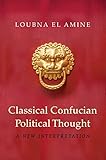Classical Confucian Political Thought : A New Interpretation / Loubna El Amine.
Material type: TextPublisher: Princeton, NJ : Princeton University Press, [2015]Copyright date: ©2016Edition: Pilot project,eBook available to selected US libraries onlyDescription: 1 online resource (232 p.)Content type:
TextPublisher: Princeton, NJ : Princeton University Press, [2015]Copyright date: ©2016Edition: Pilot project,eBook available to selected US libraries onlyDescription: 1 online resource (232 p.)Content type: - 9780691163048
- 9781400873944
- Confucian ethics
- Confucianism and state
- Philosophy, Confucian
- Political ethics
- PHILOSOPHY / Political
- Analects
- Chinese communists
- Chinese intellectual tradition
- Classical Confucianism
- Confucian ethics
- Confucian government
- Confucian political thought
- Confucian politics
- Confucianism
- Confucians
- Heaven
- Mencius
- Robert Eno
- Xunzi
- common people
- early Confucians
- economic measures
- hegemons
- heirarchical leanings
- human nature
- kings
- labor division
- meritorious ministers
- metaphysics
- ministers
- modern politics
- moral development
- moral philosophy
- order
- orderly society
- patriarchy
- penal force
- political engagement
- political involvement
- political order
- political ruler
- political theory
- post-Kantian approach
- public office
- purist approach
- religion
- rituals
- ruler
- rulers
- sage ministers
- security
- territorial states
- tian
- virtue
- zheng
- zhi
- 320.0931 23
- BL1840
- online - DeGruyter
- Issued also in print.
| Item type | Current library | Call number | URL | Status | Notes | Barcode | |
|---|---|---|---|---|---|---|---|
 eBook
eBook
|
Biblioteca "Angelicum" Pont. Univ. S.Tommaso d'Aquino Nuvola online | online - DeGruyter (Browse shelf(Opens below)) | Online access | Not for loan (Accesso limitato) | Accesso per gli utenti autorizzati / Access for authorized users | (dgr)9781400873944 |
Frontmatter -- Contents -- Acknowledgments -- Note on Translations and Transliterations -- Prologue -- CHAPTER 1. Ruler and Ruled -- CHAPTER 2. Rules and Regulations -- CHAPTER 3. A Harmonious Society -- CHAPTER 4. Rulers and Ministers -- CHAPTER 5. Political Involvement -- CHAPTER 6. Heaven in Politics -- Epilogue -- Bibliography -- Index
restricted access online access with authorization star
http://purl.org/coar/access_right/c_16ec
The intellectual legacy of Confucianism has loomed large in efforts to understand China's past, present, and future. While Confucian ethics has been thoroughly explored, the question remains: what exactly is Confucian political thought? Classical Confucian Political Thought returns to the classical texts of the Confucian tradition to answer this vital question. Showing how Confucian ethics and politics diverge, Loubna El Amine argues that Confucian political thought is not a direct application of Confucian moral philosophy. Instead, contrary to the conventional view that Confucian rule aims to instill virtue in all members of society, El Amine demonstrates that its main aim is to promote political order.El Amine analyzes key aspects of the Confucian political vision, including the relationship between the ruler and the people, the typology of rulers, and the role of ministers and government officials. She also looks at Confucianism's account of the mechanisms through which society is to be regulated, from welfare policies to rituals. She explains that the Confucian conception of the political leaves space open for the rule of those who are not virtuous if these rulers establish and maintain political order. She also contends that Confucians defend the duty to take part in government based on the benefits that such participation can bring to society.Classical Confucian Political Thought brings a new understanding to Confucian political theory by illustrating that it is not chiefly idealistic and centered on virtue, but rather realistic and driven by political concerns.
Issued also in print.
Mode of access: Internet via World Wide Web.
In English.
Description based on online resource; title from PDF title page (publisher's Web site, viewed 24. Aug 2021)


